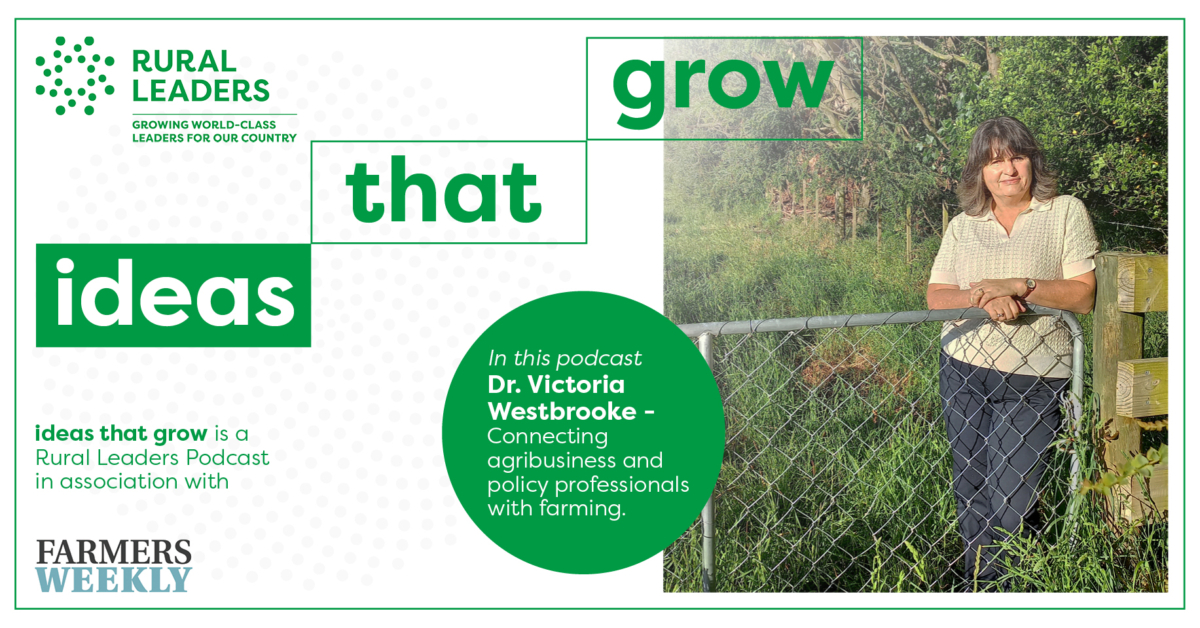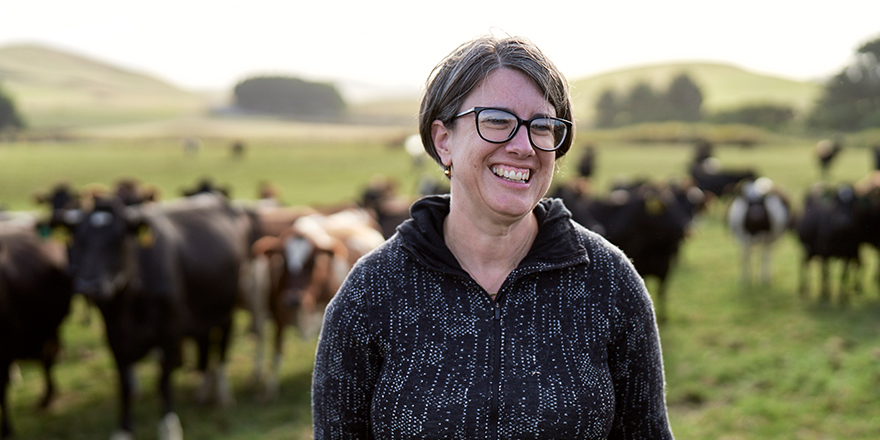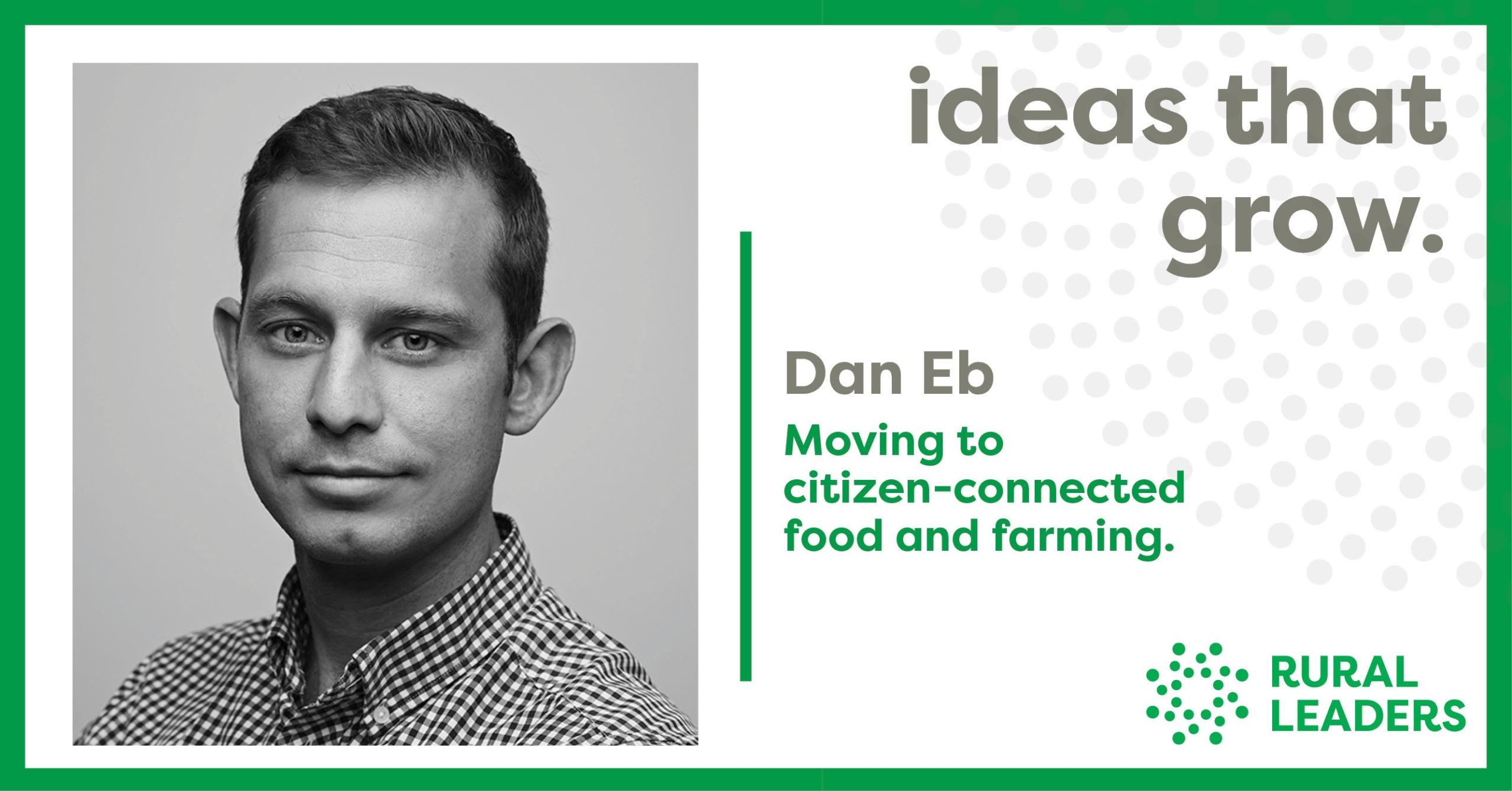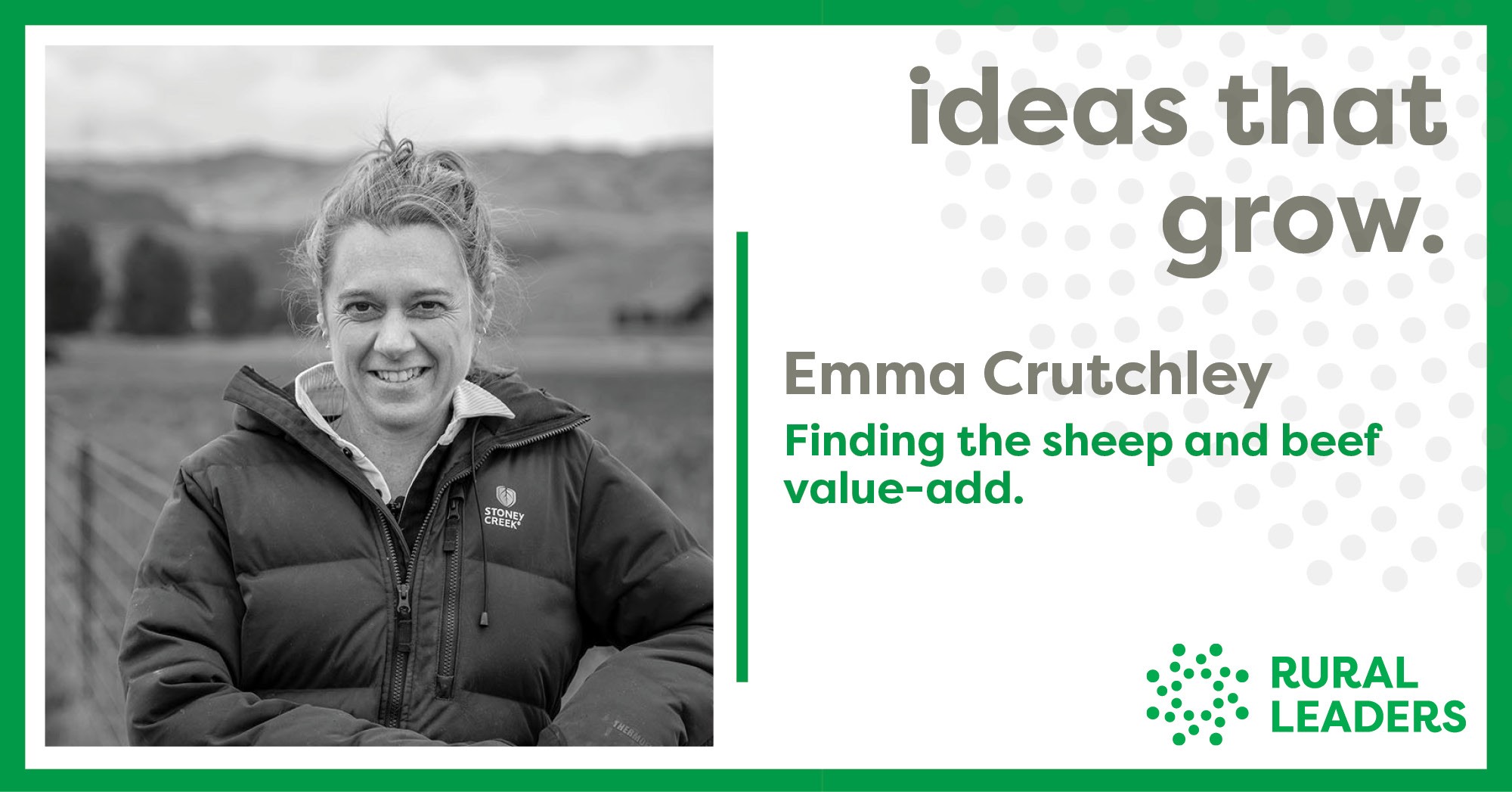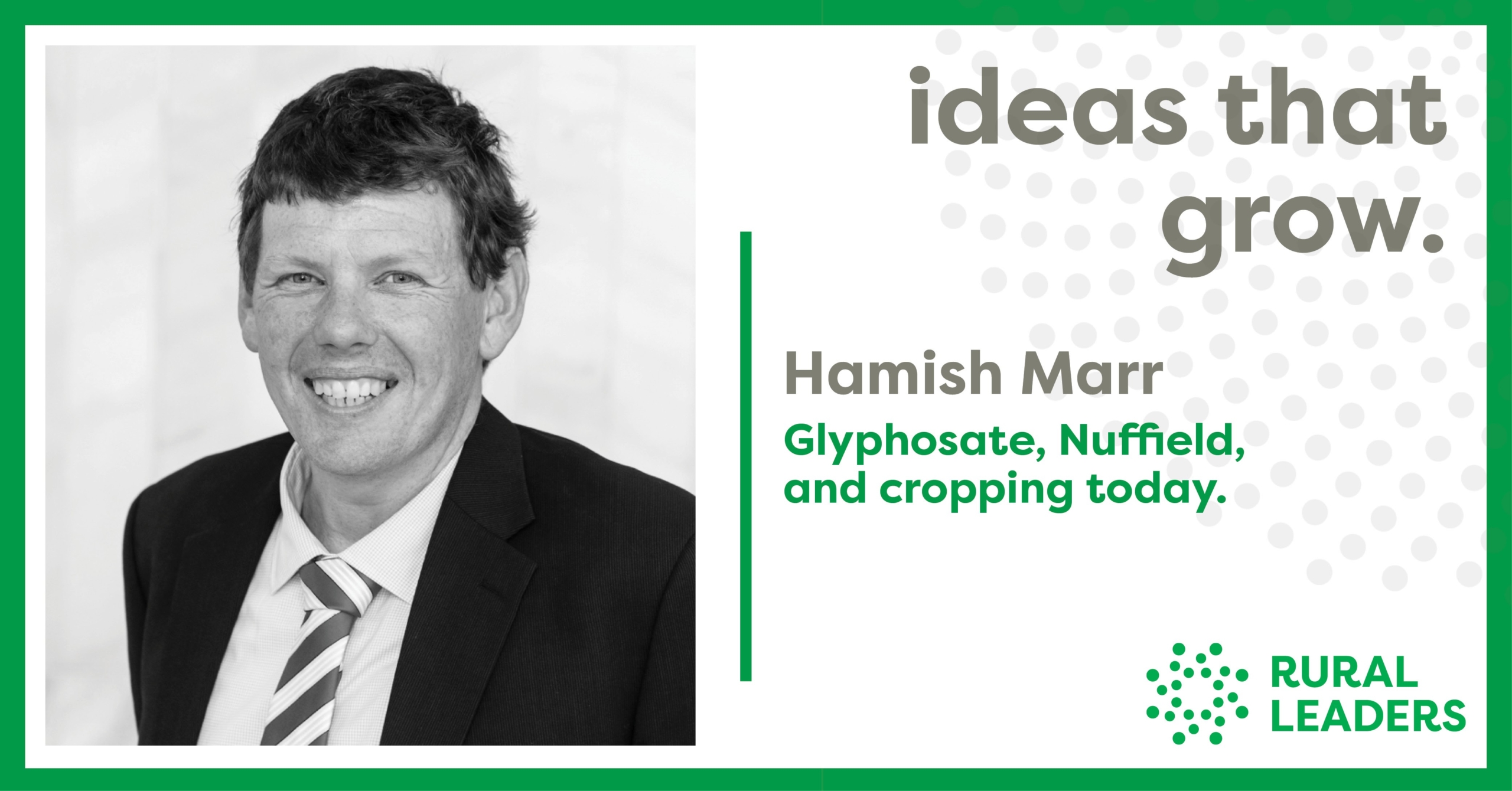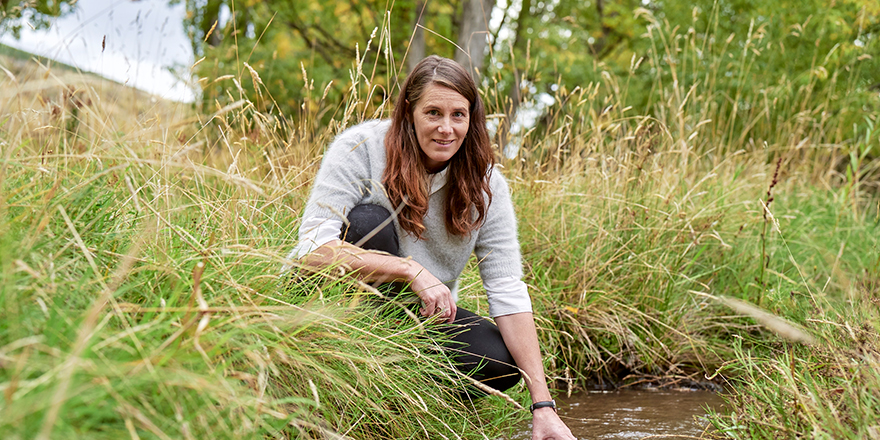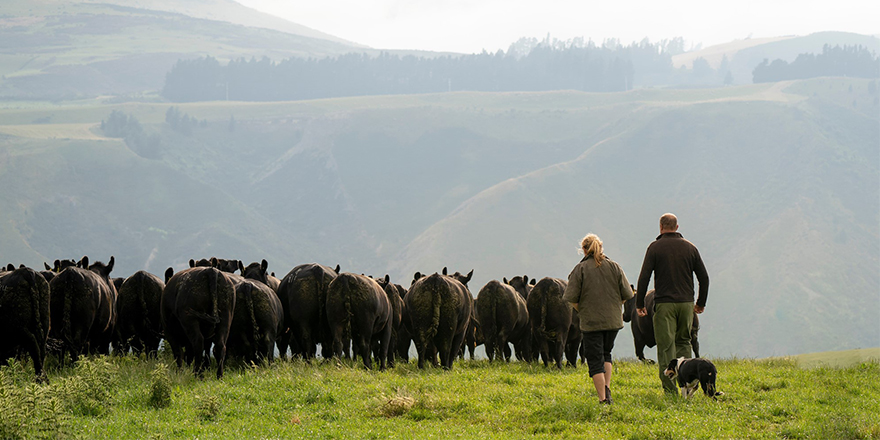Listen to this episode of Ideas that Grow, or click on one of the platform icons below to listen on your favourite player:
In this episode of Ideas That Grow, Bryan Gibson, Farmers Weekly Managing Editor, talks to Dr. Victoria Westbrooke, Senior Lecturer in the Department of Land Management and Systems at Lincoln University.
Victoria discusses the Engage Programme, a three-day professional development initiative run in partnership between Lincoln University and Rural Leaders, designed to bridge the gap between agribusiness professionals and on-farm realities.
Victoria offers keen insight into why providing contextual farm knowledge to technology specialists, researchers, environmental professionals, and policy-makers is crucial for helping them apply their expertise effectively.
Episode Transcript
You’ve joined the Ideas That Grow podcast, brought to you by Rural Leaders. In this series, we’ll be drawing on insights from innovative rural leaders to help plant ideas that grow so our regions can flourish. Ideas That Grow is presented in Association with Farmers Weekly.
Bryan Gibson, Managing Editor of Farmers Weekly:
I’m your host, Farmers Weekly editor, Bryan Gibson. This week, we’re talking about one of the specialist programmes Rural Leaders offers, the Engage programme run in conjunction with Lincoln University.
With me to discuss it is Dr. Victoria Westbrooke. Kia ora, how are you going?
Dr. Victoria Westbrooke, Senior Lecturer Department of Land Management and Systems, Lincoln University:
Great, thanks.
BG: Good. You’re a senior lecturer at Lincoln. What do you focus on there and what’s your work like?
VW: I’m only focused on farm management. I teach both undergraduate and postgraduate level. I also really enjoy teaching a class on consultancy and extension, again, at the undergrad and postgrad level. That class is really about students being able to use the information they’ve got at Lincoln and work with farmers and others to put their knowledge into practise when they leave Lincoln and to go out into the real world to work.
BG: What was your journey to Lincoln like? What’s your career background?
VW: Well, I actually did my degree at Lincoln a few years ago now. I then spent the first 10 years working as a farm consultant in the Waikato and then worked with AgResearch. So, helping translate science and research into practise. I enjoyed helping farmers reach objectives and just seeing that translation. I think New Zealand is really good at that, and it was great to be a part of it.
The next 10 years was cool. That was overseas. I spent a couple of years in UK, having a look at UK farming systems and indulging in my passion of travel. We then moved to Australia, where I did my PhD and had a look at some farm systems there, which were completely different, merging on tropical systems.
For the last 10 years or so, I’ve been lecturing at Lincoln, again in farm management and extension and doing some research on the side as well. I enjoy working with students and seeing their journeys as they grow.
BG: Did you always know that the food and fibre sector would be where you would work?
VW: I guess so. I really enjoy growing things. I’m a keen gardener and have this most wonderful garden at home, which I’m very lucky for. Love seeing people grow too, seeing ideas work on farms, love seeing farmers get where they want go. That sort of thing gives me a real kick.
A partnership to develop stronger connections with farmers.
BG: Rural Leaders has a pretty close relationship with Lincoln University. Tell me a little bit about how Lincoln contributes to the Rural Leaders programmes.
VW: I guess I can talk about the Engage one as a specific example. What I saw is we had a need for some really good professionals in the sector that may not necessarily have had a farm background. I’m talking about technology people, some researchers, environmental people. I thought, how can we welcome them into the sector and give them some background or context to New Zealand farming systems to turbocharge the knowledge and expertise that they already have. How can we help them to apply it.
When I was working on that, I thought Rural Leaders would be the ideal group to work with. They’ve got a good track record. I found them really excellent. We could sit down throw ideas around. That’s how it worked for me in my situation was just having their expertise, a very strong track record, strongly networked into the industry. For me, they were the ideal partner.
BG: Yeah, I guess one of the key challenges that our food and fibre sector has is that there’s often a feeling among farmers in the field that some of the bureaucrats or other people who are agribusiness professionals or at least having an input into how farming is done in New Zealand, some of them don’t have that knowledge of what it’s like to actually implement these things in the field every day.
Knowledge, confidence and connection in agriculture.
VW: The people that we’ve worked with through Engage, who have participated, are keen to work with farmers and help them work well in New Zealand Inc. That passion is really there. Part of this programme is, how can we help them with some of that context in a way that suits their professional lifestyle and their professional requirements and get them connecting directly with farmers, not through two or three other links.
Some form of experiencing the farmer’s challenges. Initially, I had thoughts of participants spending a day with a farmer in their ute. I’m not sure that was particularly practical for everybody. Again, working with rural leaders, we were able to mould that working with farmers and talking directly with farmers into a three-day, doable programme for everyone that got some of that close connection.
For example, one of the participants was actually staying with me. She came from Wellington, hadn’t spent a lot of time on farms, and simply getting her rugged up to go out for a day on farm in July – she experienced the environment the farmer worked in. Simply making sure she had gloves, hat, mittens, and that kind of thing. That was something that you can’t read about or doesn’t normally land if you read about it. But if you’re going out for a day, it does.
BG: You mentioned people being Wellington-based. A lot of people who are decision-makers or policymakers, that sort of thing, are in the cities. Having that first-hand experience of the farming life must make them a lot more confident or at least know that their day-to-day work will land better with those who are having to implement it.
VW: Yeah, it just provided a real background and that lived experience. We’ve got the Engage programme at three days. The key is the middle day, actually going on farm. They’ve spent a day working together in a discussion group format that Rural Leaders does very well. Then it’s onto a bus and going out to our wonderful host farmer. We’ve had Malcolm Cairns and Hamish Marr. The morning’s out on a mixed arable operation, family-based. Then the afternoon has been going out to Matt Iremonger’s which is more of a focus on dairy and technology.
On one of our first programmes, a lot of the participants were just quite keen to do a bit of calf feeding. We were going to talk about some really high-brow stuff. They saw the calves and they really enjoyed it. Seeing Matt operate Halter, we turned up when the cows were to go for milking. We stood in the paddock and Matt and his manager at the time were driving halter and we could see it. Seeing it then talking about the people who are actually working with it, seeing the cow’s reaction, just that really one-to-one or based experience is really important and really enjoyable.
What to expect from the Engage Programme.
BG: If someone signs up for the Engage programme, maybe just talk through what they can expect when they’re doing it.
VW: Firstly, it’s a really welcoming environment that Rural Leaders provides. It’s facilitated. There’s lots of discussions. It’s not a talk at or dare I say lecture type environment. We definitely didn’t want that. These people are professionals with really impressive skills and expertise. It’s more of a discussion, not a ‘talk to’.
Rural Leaders, through their networks, have got some excellent people for the first day, providing an overview of the global perspective of agriculture. We’ve got some people that wear both a farmer hat and professional hat talking about challenges farmers faced.
Then I talk about farming systems and farm finances. This is very much from the farmer perspective, and as much as possible, there’s people that are actually farmers and involved in there. We’re talking about the whole Ag sector. Often, we work in our own particular area that we’re passionate about. I like Ag extension and consultancy type things, but it’s important to look at the whole package because farmers are faced with a whole package, not just fertiliser, which we may work in, or environment that we may work in. Often, there’s a group dinner, and the discussions there are probably just as important as those held during the day.
Participants have actually met people from different parts of the sector as well. The highlight for me has always been the day on farm, which I’ve just briefly discussed. So out in the bus, take lunch, and talking directly with the farmers. We go and have morning tea with them. They take us around their farm. The farmers are experienced talking to groups, but they’re still at the coalface. Those visits tend to go a little bit into the areas that participants are interested in. The final day is two-thirds of a day. There’s a talk about reflection about what they found on farm, Māori land ownership and perspectives. That’s a really good session. Then we talk about rural communities. The reason for that is, again, looking at the whole picture that farmers are sitting within not just one particular aspect. Then there’s finishing up looking at environmental consulting, but that can vary depending on the group.
Looking at the whole farming system.
BG: You mentioned the rural communities. That’s really important because I think some people sitting off remotely would view a farm as a set of financial budgets or a catchment for nutrients and water cycling and that sort of thing. But in actual fact, it’s a place where a family lives. There are neighbours, there are schools, there are rugby clubs. Those things are what sustains farming communities.
VW: Yeah, it’s that whole system, that environment, looking at it, that’s really important. I think we get passionate about as a profession, our own particular area. This is a chance to look at the whole system from a farmer’s perspective. You may get an appreciation of where your particular passion area sits within the farmer’s world type thing. Why are they not as passionate as you about your area? Well, this is where it sits for a farmer and how it fits with their bigger thing.
We had one person who is looking at offering a technology service on farm, and he went away delighted because he could then see where his technology offering could fit for farmers, what from a farmer’s perspective might spin their wheels, save them time, whatever. He said, Okay, he will now develop his offering in that way to fit more with what a farmer may actually want. He understood why they may be reluctant to take his technology offering from his business.
BG: That’s amazing because you see it time and again, someone turns up with what they feel is like the latest game-changing bit of tech that’s going to change farming. But when it actually comes to implementing it on farm, they perhaps haven’t had that close contact to know if it’s working in with the other things that happen day to day on a farm.
VW: Yeah, it’s this massive load of cogs all in to react and big clockwork mechanism in an old analogue clock. They all interweave together.
Looking closer at the Engage Programme.
BG: One of the things that comes up-time and again in these chats I have with people who have been involved in Rural Leaders programmes is that the course itself is great, but one of the great pieces of value you get from it is the network and the connections you make while you’re on the course. That seems to be the case here, too.
VW: It’s not as long as Kellogg or some of the other courses. It is a three-day course. That was deliberate because when we did our initial research, we got strong feedback that because it’s a face-to-face course, we had to recognise the time limitations people have in professional life. That’s why we came up with the three-day programme because we did want to keep it face-to-face.
Rural leaders are passionate about that, which I agree with, because then you can actually talk directly to people. I think the group dinner and the way that it’s facilitated lets people meet from different aspects. We’ve had people that have reconnected or got a list of people that if they need somebody in this different area, they now have somebody that they can contact to do that. So, yeah, that’s another important part of sharing.
BG: When we pull back and look at the bigger picture of New Zealand’s food and fibre sector, we are having big conversations about how to develop people into leadership roles. Sometimes you can look at it as there’s farmers who come up through industry bodies, and there’s agribusiness professionals who maybe have a more academic path. The Engage system, to me, seems to be a way to bring that together.
VW: Yeah, it’s, again, the people that are passionate about the food and fibre sector have some wonderful skills and knowledge that we very much need. I’m really hoping we’ll provide them with the confidence to go on to some of those leadership roles with just that wee bit more contextual knowledge or the farmer’s view.
The other thing is some people coming on the programme work with one particular group of farmers, and this is, again, just broadening out for that background and context. So hopefully, it’s part of their leadership journey. They also know how Rural Leaders operate then through the programme, so they can have a taster of what our future work with Rural Leaders may look like. That’s useful as well, I think.
BG: Yeah, I guess it gives people a bit more empathy with the people who might be end users of either the product or the policy that they are working on, you get a better understanding of how that lands, what that means for someone’s day-to-day life, that thing.
If someone’s keen in finding out more about the Engage programme or perhaps signing up, what’s the next step for them?
VW: Rural Leaders They have an excellent website, and they have all of the details there. My understanding is the Engage programme will be running next year.
The other option is Rural Leaders have customised the programme and can do so for particular groups. For ASB, they work with their rural managers who really wanted to focus on environmental aspects. They took out the day on farm because those rural managers are constantly out on farm. That programme was adapted for them. They’ve also worked with the Ellett Trust and other groups there to develop a programme specifically for scientists and researchers to communicate with farmers. That customisation option is available as well.
BG: Thanks for listening to Ideas That Grow, a Rural Leaders’ podcast presented in Association with Farmers Weekly. For more information on Rural Leaders, the Nuffield New Zealand Farming Scholarship, the Kellogg Rural Leadership Programme, the Engage Programme and the Value Chain Innovation Programme, please visit ruralleaders.co.nz.
